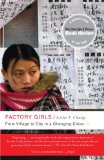Summary | Excerpt | Reviews | Beyond the Book | Readalikes | Genres & Themes | Author Bio

Critics' Opinion:
Readers' Opinion:
First Published:
Oct 2008, 432 pages
Paperback:
Aug 2009, 448 pages
 Book Reviewed by:
Book Reviewed by:
Karen Rigby
Buy This Book
Her factory's name was Carrin Electronics. The Hong Kong-owned company made
alarm clocks, calculators, and electronic calendars that displayed the time of
day in cities around the world. The factory had looked respectable when Min came
for an interview in March 2003: tile buildings, a cement yard, a metal accordion
gate that folded shut. It wasn't until she was hired that she was allowed
inside. Workers slept twelve to a room in bunks crowded near the toilets; the
rooms were dirty and they smelled bad. The food in the canteen was bad, too: A
meal consisted of rice, one meat or vegetable dish, and soup, and the soup was
watery.
A day on the assembly line stretched from eight in the morning until
midnight--thirteen hours on the job plus two breaks for meals--and workers
labored every day for weeks on end. Sometimes on a Saturday afternoon they had
no overtime, which was their only break. The workers made four hundred yuan a
month--the equivalent of fifty dollars--and close to double that with overtime,
but the pay was often late. The factory employed a thousand people, mostly
women, either teenagers just out from home or married women already past thirty.
You could judge the quality of the workplace by who was missing: young women in
their twenties, the elite of the factory world. When Min imagined sitting on the
assembly line every day for the next ten years, she was filled with dread. She
was sixteen years old.
From the moment she entered the factory she wanted to leave, but she pledged to
stick it out six months. It would be good to toughen herself up, and her options
were limited for now. The legal working age was eighteen, though sixteen- and
seventeen-year-olds could work certain jobs for shorter hours. Generally only an
employer that freely broke the labor law--"the very blackest factories," Min
called them--would hire someone as young as she was.
Her first week on the job, Min turned seventeen. She took a half day off and
walked the streets alone, buying some sweets and eating them by herself. She had
no idea what people did for fun. Before she had come to the city, she had only a
vague notion of what a factory was; dimly, she imagined it as a lively social
gathering. "I thought it would be fun to work on the assembly line," she said
later. "I thought it would be a lot of people working together, busy, talking,
and having fun. I thought it would be very free. But it was not that way at
all."
Talking on the job was forbidden and carried a five-yuan fine. Bathroom breaks
were limited to ten minutes and required a sign-up list. Min worked in quality
control, checking the electronic gadgets as they moved past on the assembly line
to make sure buttons worked and plastic pieces joined and batteries hooked up as
they should. She was not a model worker. She chattered constantly and sang with
the other women on the line. Sitting still made her feel trapped, like a bird in
a cage, so she frequently ran to the bathroom just to look out the window at the
green mountains that reminded her of home. Dongguan was a factory city set in
the lush subtropics, and sometimes it seemed that Min was the only one who
noticed. Because of her, the factory passed a rule that limited workers to one
bathroom break every four hours; the penalty for violators was five yuan.
After six months Min went to her boss, a man in his twenties, and said she
wanted to leave. He refused.
"Your performance on the assembly line is not good," said Min's boss. "Are you
blind?"
"Even if I were blind," Min countered, "I would not work under such an
ungrateful person as you."
She walked off the line the next day in protest, an act that brought a hundred-yuan
fine. The following day, she went to her boss and asked again to leave. His
response surprised her: Stay through the lunar new year holiday, which was six
months away, and she could quit with the two months' back pay that the factory
owed her. Min's boss was gambling that she would stay. Workers flood factory
towns like Dongguan after the new year, and competition for jobs then is the
toughest.
Excerpted from Factory Girls by Leslie T. Chang Copyright © 2008 by Leslie T. Chang. Excerpted by permission of Spiegel & Grau, a division of Random House, Inc. All rights reserved. No part of this excerpt may be reproduced or reprinted without permission in writing from the publisher.





The House on Biscayne Bay
by Chanel Cleeton
As death stalks a gothic mansion in Miami, the lives of two women intertwine as the past and present collide.

The Flower Sisters
by Michelle Collins Anderson
From the new Fannie Flagg of the Ozarks, a richly-woven story of family, forgiveness, and reinvention.

The Funeral Cryer by Wenyan Lu
Debut novelist Wenyan Lu brings us this witty yet profound story about one woman's midlife reawakening in contemporary rural China.
Your guide toexceptional books
BookBrowse seeks out and recommends the best in contemporary fiction and nonfiction—books that not only engage and entertain but also deepen our understanding of ourselves and the world around us.